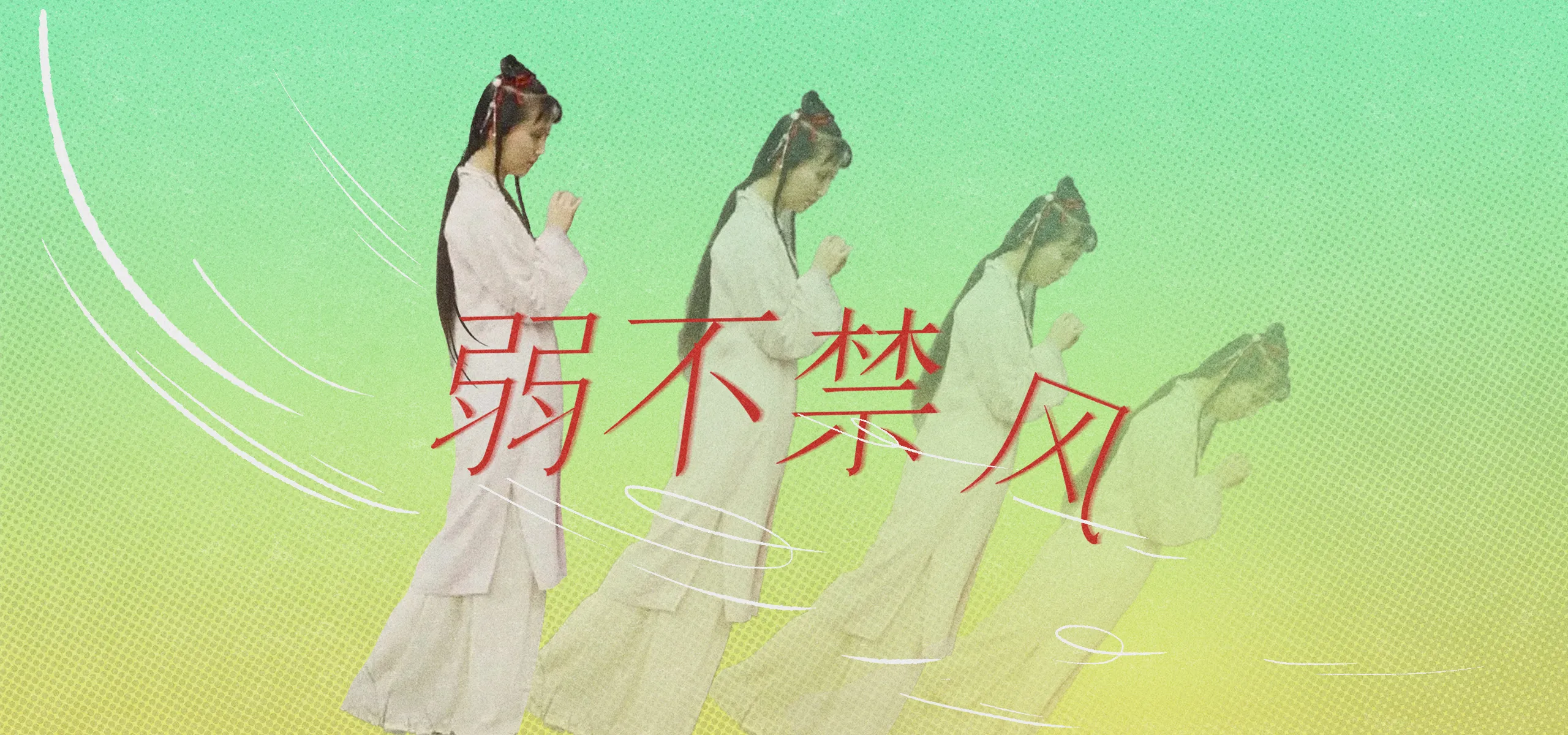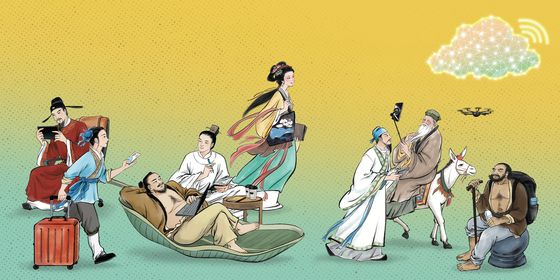As China launches a national weight management campaign, we take a look at idioms about being thin—once considered another major health risk throughout much of the country’s history
While China’s annual “two sessions” political meetings each March typically generate a flurry of new ideas and policy proposals for public debate, this year, one struck a more visceral chord—it went straight to the nation’s stomach. It was an easy target, and as Dr. Lei Haichao, director of the National Health Commission, noted, it’s been expanding alarmingly each year. At the meetings, Lei introduced a three-year national “Weight Management” plan aimed at promoting healthier lifestyles. Behind this initiative lies the sobering reality of China’s obesity problem: A 2021 study published in The Lancet, a British medical journal, found that 402 million Chinese adults were overweight or obese—the highest number in the world. That figure is projected to climb to 627 million by 2050. Following Lei’s proposal, the phrase “the nation is calling you to lose weight” quickly went viral on social media.
Learn more about Chinese idioms:
- Idiomized: How to Spend Your Vacation in 4 Characters
- Idiomized: How to Rebel in 4 Characters
- Idiomized: How to Talk Fake News in 4 Characters
However, obesity is a relatively recent issue in China. As late as the mid-20th century, malnutrition caused by insufficient food intake was still widespread, with many residents, especially in rural areas, living in poverty. Although there have occasionally been mentions of weight loss throughout China’s millennia of history, “thinness” has also never been a fixed aesthetic preference. Instead, when we look through dictionaries, we find that while there are many idioms related to “thinness,” they often carry negative connotations.
Too weak to withstand the wind 弱不禁风
Being thin was traditionally associated with frailty. The idiom 弱不禁风 (ruòbùjīnfēng, “too weak to withstand the wind”) is often used to describe those with delicate, frail physiques. Lin Daiyu, the female protagonist of the classical novel Dream of the Red Chamber (《红楼梦》), embodies this image. So you might hear a saying such as:
She looked as fragile as Lin Daiyu, as if a breeze could topple her.
她弱不禁风的样子,像林黛玉似的。
Skin and bones 骨瘦如柴
Idioms on extreme thinness are often vivid, describing the state of having only skin and bones. The idiom 销毁骨立 (xiāohuǐ gǔlì, “wasted away to skin and bones”) describes extreme emaciation. It was first used in the Book of Liang (《梁书》) in the biography of Emperor Wu of the Liang dynasty (502 – 557). He was away when his father passed away, and upon hearing the news, he traveled day and night. By the time he arrived in the capital, he had wasted away to skin and bones that his family and friends could hardly recognize him.
A similar idiom comes from A New Account of the Tales of the World (《世说新语》), a 5th-century collection of anecdotes about Chinese scholars, artists, and musicians. During the Jin dynasty (265 – 420), Wang Rong (王戎) and He Qiao (和峤), both renowned for their filial piety, reacted differently to the deaths of their parents. He Qiao strictly observed ritual propriety, wailing and weeping in mourning. In contrast, Wang Rong was so overcome with grief that he grew emaciated to the point of being described as having 鸡骨支床 (jīgǔ zhīchuáng, “chicken-bone-like ribs leaning against the bed”), unable even to rise. The account suggests that Wang’s visible suffering represented the truest form of filial piety. The idiom later came to describe someone who is extremely thin, often as a result of grief.
Despite their intriguing historical origins, the two idioms above are rarely used outside of historical or literary contexts. A more commonly used expression for describing someone who is extremely thin, often to the point of appearing unhealthy, is the chengyu 骨瘦如柴 (gǔshòurúchái), which literally means “as thin as firewood.”
Addicted to gaming, he reversed day and night, and after a few months, was skin and bones.
他沉迷于游戏,昼夜颠倒,几个月后竟然变得骨瘦如柴。
The slender waist of Chu 楚腰纤细
In rare cases, being skinny was considered fashionable in ancient China. One such instance is recorded in the Mozi (《墨子》) , an ancient Chinese text from the Warring States period (475 – 221 BCE). King Ling of Chu had a preference for people with slender waists. As a result, court officials, fearing that they would lose favor and trust if they were overweight, dared not eat too much. They restricted themselves to one meal a day to control their waistlines. Each morning, they would first hold their breath, tighten their belts, and lean against the wall just to stand up. Within a year, all the officials at court had grown sallow and emaciated. This story later came to symbolize how subordinates will scramble to satisfy a superior’s whims. The chengyu 楚腰纤细 (chǔyāo xiānxì, the slender waist of Chu) originated from this story and later came to refer specifically to the slim waist of a beautiful woman.
To get that slim, graceful figure, she sticks to a daily yoga routine.
为了追求楚腰纤细的身段,她每天坚持练瑜伽。
Jade wanes, fragrance fades 玉减香消
Interestingly, when it came to describing weight loss, ancient people did not express it as directly or positively as we do today. For example, when describing a beautiful woman becoming thinner, they might use the phrase 玉减香消 (yùjiǎn xiāngxiāo, “jade wanes, fragrance fades”). In ancient Chinese, both 玉 (jade) and 香 (fragrance) were commonly used to symbolize a beautiful woman. Thus, the idiom conveys that the beauty has become thinner, usually due to illness or sorrow, with an underlying tone of pity.
For men, the phrase 沈腰潘鬓 (Shěnyāo Pānbìn, “thinning waist like Shen and graying temples like Pan”) is used to describe weight loss. “Shen” refers to Shen Yue (沈约), a literary figure from the 5th and 6th centuries. The Book of Liang records that Shen once wrote to a friend about his rapid aging and weight loss, saying, “In just a little over a hundred days, I have to tighten my belt buckle.” “Pan” refers to Pan Yue (潘岳), a literary figure from the 3rd and 4th centuries, who was famous for his handsome appearance but had gray temples in his 30s. Thus, the idiom is used to describe a person becoming thin and aging. A famous verse by Li Yu (李煜), the defeated ruler of the Southern Tang dynasty (937 – 975), used this chengyu poetically: “Once made a captive subject, my waist grew thin like Shen’s, my temples grey like Pan’s (一旦归为臣虏,沈腰潘鬓消磨).”
She’s been working overtime for months, and has lost so much weight that her friends barely recognize her.
她连月加班,玉减香消,朋友几乎认不出她来。
Plump as Yang and slender as Zhao 环肥燕瘦
While sadness and aging often dominated ancient language surrounding weight, there are also some examples of positivity and praise. One such example is the idiom 环肥燕瘦 (Huánféi Yànshòu, “plump as Yang and slender as Zhao”). Yang Yuhuan (杨玉环), the imperial concubine of Emperor Xuanzong of the Tang dynasty (618 – 907), and Zhao Feiyan (赵飞燕), the empress of Emperor Cheng of the Han dynasty (206 BCE – 220 CE), are both historically recognized beauties. However, Yang was known for her plump figure, while Zhao was famed for her extreme slenderness. Thus, the idiom celebrates how beauties with different physical characteristics each possess their own charm. It also serves as a metaphor for how different artistic styles each have their unique strengths.
Beauty isn’t one-size-fits-all—Huan’s curves or Yan’s slimness, both are beautiful.
美不只有一种样子,环肥燕瘦都是美。












